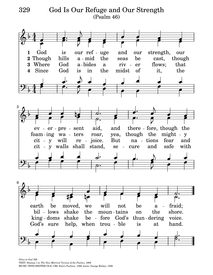Go Ad-Free
If you regularly use Hymnary.org, you might benefit from eliminating ads. Consider buying a Hymnary Pro subscription.
If you regularly use Hymnary.org, you might benefit from eliminating ads. Consider buying a Hymnary Pro subscription.

1 God is our refuge and our strength,
our ever present aid,
and therefore though the earth should move,
we will not be afraid;
Though hills are thrown into the sea,
though foaming waters roar,
and though the mighty earthquake moves
the mountains on the shore.
2 A river flows whose streams make glad
the city of our God,
the holy place in which the LORD
Most High has His abode.
Since God in the midst of her
unmoved her walls shall stand,
for God will help at break of day,
when trouble is at hand.
3 The nations rage, and kingdoms fall,
but, when His voice is heard,
all earthly pow'r shall melt away
before His mighty Word.
The LORD of hosts is on our side,
our safely to secure;
the God of Jacob is for us
a refuge strong and sure.
4 O come and see what mighty works
the hand of God has done;
come, see what desolation great
He brings beneath the sun.
To utmost ends of all the earth
He causes wars to cease;
the weapons of the strong destroyed,
He makes a lasting peace.
5 "Be still and know that I am God,
set over all on high;
the humbled nations of the earth
My Name shall magnify."
The LORD of hosts is on our side,
our safety to secure;
the God of Jacob is for us
a refuge strong and sure.
Source: Psalms of Grace #46e
| First Line: | God is our refuge and our strength, Our ever present aid (Presbyterian Church USA) |
| Title: | God a Very Present Help |
| Meter: | 8.6.8.6 |
| Language: | English |
| Notes: | Spanish translation: See "Refugio y fortaleza es Dios" by Priscilla Piñero |
| Copyright: | Public Domain |
A celebration of the absolute security of the city of God.
Scripture References:
st. 1 = vv. 1-3
st. 2 = vv. 4-5
st. 3 = vv. 6-7
st. 4 = vv. 8-9
st. 5 = vv. 10-11
This song in celebration of Zion's security (see also 48 and 76) has heartened God's people throughout the ages. Luther echoed it in "A Mighty Fortress Is Our God" (469). Traditionally ascribed to (or assigned to) the "sons of Korah," the psalm was no doubt composed for liturgical use at the temple. As a song concerning the royal city of the kingdom of God on earth, it expresses Israel's hope in the certain triumph of God's kingdom. The psalm's imagery of a river that "make[s] glad the city of God" (v. 4) serves as a metaphor for the unfailing flow of God's sustaining and refreshing blessings, which make the city of God like the Garden of Eden (Gen. 2: 10).
In this psalm we confess fearless trust in God, "our refuge" (st. 1), and extol God's refreshing river and protective presence (st. 2). God stills the rage of the nations, inspiring us with faith's strong confidence (st. 3). The LORD's mighty victories assure us of the people's peace (st. 4), and God's reassuring word "Be still, and know. . ." inspires us again with the confidence of faith. (st. 5). The versification is based on the 1650 Scottish psalter version, which was altered in both the 1871 and 1912 American psalters and now again in the 1987 Psalter Hymnal. Hymns based on Psalm 46 are at 468, 469, and 610.
Liturgical Use:
Suitable for many occasions in Christian worship, especially for times of war or persecution, confusion and loss, whenever the conflict between church and world sharpens. Also for Old or New Year services.
--Psalter Hymnal Handbook, 1988


 My Starred Hymns
My Starred Hymns